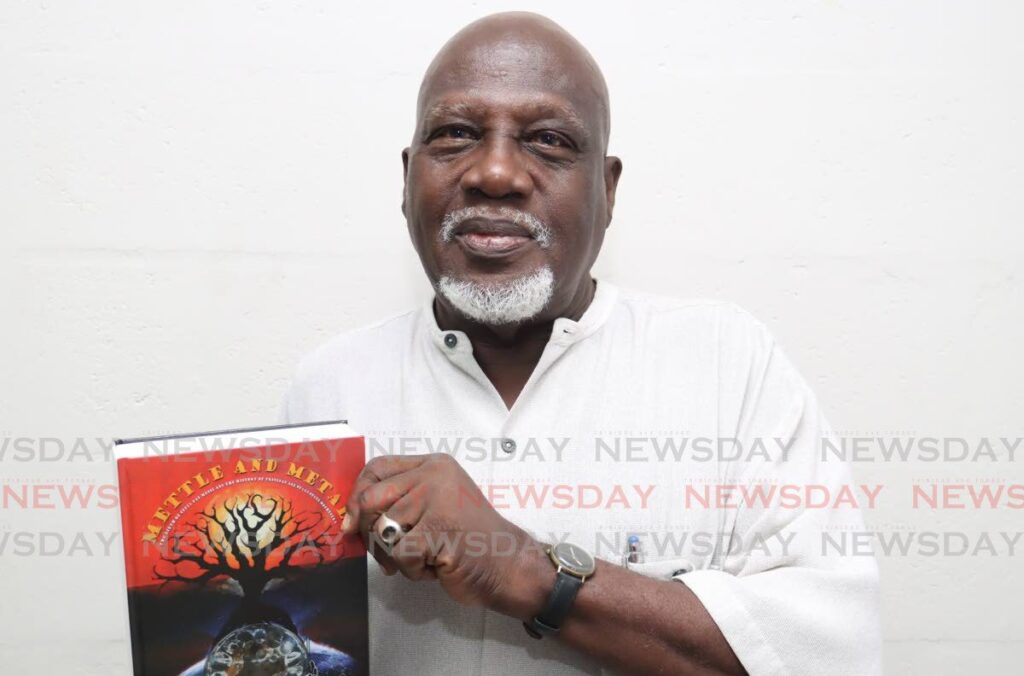A Bukka Rennie explores history of pan, All Stars with Mettle and Metal

“It was either pan or nothing.”
These are the words of A Bukka Rennie, writer, historian, and activist, as he reflects on his lifelong fascination with pan music, a fascination that led him to pen an ambitious book about the history of the instrument intertwined with the journey of one of Trinidad and Tobago’s most acclaimed steelbands – Trinidad All Stars Steel Orchestra (TASSO).
Mettle and Metal: The Birth of Steel Pan Music and the History of Trinidad All Stars Steel Orchestra, is Rennie’s latest book, adding to his collection of works: Remembering and Understanding CLR James and History of the Working Class in the 20th Century (1919-1956): The Trinidad and Tobago Experience. It was published in 2023 by Austin Macauley Publishers and will be formally launched May 21 in a ceremony at the All Stars panyard.
Rennie says the book was a passion project that was over two decades in the making for his beloved band, which he’s played with for years.
“I wanted to write the book. I felt that urge to say something about (All Stars). Because you’re in the band and you’re seeing certain things and you’re hearing all these old men talking about their experience and I thought it would’ve been interesting.”
Rennie said several things happened to him when he was younger that led him to being involved with pan music. When his family moved from San Juan to St Augustine, they lived obliquely opposite Cinco's panyard. There he developed an interest in the sounds of pan music at the age of ten. He recalls trying to go to the panyard with his brothers.

“My father chased me out of that panyard and threatened me not to ever be caught in the panyard.”
His father bought a piano to steer his musical taste in another, more acceptable direction, he says.
“But me and Winston decided we wanted to have nothing to do with the piano – it was either pan or nothing.”
When his family moved from St Augustine to Mt Hope, he was introduced to a group of young men from All Stars. Rennie said it was “destiny” that he ended up being a part of All Stars, one of the revellers who would make costumes and join the band on the road for Carnival.
He gives credit to Noel “Cin Cin” Lorde, who was regarded as “president” of a group of boys from Jackson Place, East Dry River, who ended up becoming some of the top men in All Stars, such as Hamilton “Web” Alexander and Red Stevens (Errol Reds Collins). Rennie soon became involved with the Mt Hope Boys, who would design their own costumes and join the band on the road.
“So when I go to Mt Hope now, I am meeting a whole group of guys from Nelson Street, from Duncan Street, from Gonzales, and they are all All Stars people...The next thing I know, we are bringing a section in All Stars band on Carnival Day.”
From then, Rennie says he has played faithfully with the band, playing mas every year.
“There’s no way I could sit down home and not (play with All Stars). Tuesdays I have to be in the band...And I’ll be there as long as I could walk.”
Trinidad All Stars Steel Orchestra was established in 1935. Rennie’s book chronicles its development as it cycled through several name changes over the years, from Hell Yard Boys, First Eleven, Second Fiddle, Cross of Lorraine and finally All Stars. The band’s first captain was Herbert “Sagiator” Drayton.
All Stars originated from a turbulent setting, forming out of East Port of Spain in a pre-independent Trinidad. At that time, pan was still in its early days and not widely accepted as a legitimate art form. East Port of Spain, the “Hell Yard,” was a poverty-stricken area, facing social issues such as crime and unemployment. Rennie says it was viewed as a deviant, violent and disruptive youth subculture, viewed by the colonial authorities as low-brow and disruptive.

“At that time, it was all a badjohn thing and it was about contests and fights between steelbands on the road on Carnival day...and people saw it as that – bad boys looking to rule the roost.”
Although some violence did occur between bands, Rennie’s account emphasises that All Stars, particularly under the leadership of iconic captains such as Neville Jules, tried to distinguish themselves from the negative stereotypes. Their dedication to fostering a disciplined and positive image was pivotal in helping All Stars stand out from other bands – and helped contribute to elevating pan as a whole.
Rennie’s book is dedicated to Neville Jules, the orchestra’s legendary seventh captain and pan pioneer who invented the alto pan, guitar pan, tenor pan and bass pan. According to Rennie, Jules was “a son of the soil who gave the world the melody-pan and the steel orchestra.”
In the book, he lays out a proposal for Jules to be duly honoured and for Hell Yard to be transformed into the Neville Jules Centre for Social Change and the yard to be recognised as an international heritage site.
Rennie explains that All Stars viewed its involvement with the pan as a responsibility and a gift.
“(There was) a responsibility for what you do as a gift to the world. And a lot of the panmen who stayed over the years that was the purpose: that this was a gift that they were giving to the world.”
And it’s a gift that All Stars has offered the world for 89 years. Currently the reigning International Panorama champions, All Stars has won the National Panorama competition 11 times and placed in the top three 29 times.

The band won its first Panorama title with a Rudy Wells arrangement of Lord Kitchener’s Rain-O-Rama. Arranger Leon “Smooth” Edwards led the band to victory in several other competitions – he is the arranger who holds the record for the most wins with the orchestra, Rennie notes.
Historically, the orchestra has been integral to the Carnival scene, winning the Large Costumed Band of the Year in 2014 and 2015. It is also six-time National Steelband Music Festival champions, promoting Trinidad and Tobago’s culture globally.
Reflecting on the legacy of the band, Rennie believes All Stars to be “the most loved band in this country.”
This mutual love was cultivated through a steadfast dedication to the community. It is a demonstrated people’s band – closely linked to its home base, East Port of Spain.
“All Stars plays music for the people. They go out there to encourage you to dance and be involved.”
Maintaining its identity as an East Dry River band was important to the band.
He recalls captain Beresford “Berry” also known as “Manage” Hunte, the 11th captain of the band and a tenor player, leading the band straight down George Street and sometimes making the entire block around the community so that residents and shut-ins who were infirm or unable to join the band for various reasons could still enjoy music and entertainment.
“And it was a thing for him to go down George Street and see people, and swing on Nelson (Street) and see people open their windows, people who otherwise infirmed...and that was the pleasure of the band, to do that...love for the community...
"So today, when people give All Stars that kind of recognition, it’s because of all that, that consistency that we have maintained over the years, without fear.”

The All Stars Youth South Steel Orchestra claimed its first Junior Panorama title in 2021 with The Fog, arranged by Kygel Benjamin. In April 2023, All Stars launched the TASSO Academy, offering formal music education and community outreach.
Young people play a crucial role in All Stars' mission. Indeed, the pan tradition itself emerged from the talent and enthusiasm of young people. Rennie hopes the book will serve as a inspirational guide for the youth.
“The book is there, and it’s for the future. The young (people) in the band now who are aspiring to be whatever, to understand the nature of the instrument that they have and the nature of the institution that grew them and why it is today so welcome in Trinidad and Tobago and the world.”
Looking ahead, he hopes All Stars can maintain the legacy of its establishing forces.
“I would like them to continue what they’re doing and the way in which they do it is important...All Stars have a programme that they’re working with and they’ve held this yard, built this yard to what it is now, and I would like them to continue so...And we must keep developing the youngsters to take control with that same kind of head that we passed on.”

Comments
"A Bukka Rennie explores history of pan, All Stars with Mettle and Metal"